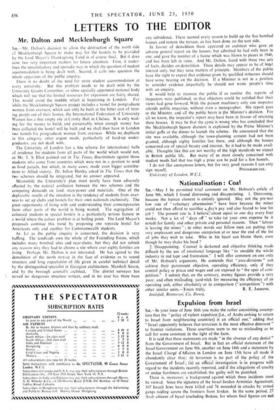Nationalisation : Coal
SIR,—May I be permitted brief comment on Mr. Hobson's article of June 9th, which I found distressing and disappointing. I. Distressing, because the human element is entirely ignored. May not the pre-war low rate of " voluntary absenteeism " have been because the miner could not then afford to sacrifice a,slay's pay and also feared to lose his job ? The present rate is. I believe, bout equal to one day every four weeks. Not a lot of "days off " to take (at your own expense be it noted) for family and other private and personal reasons. Then " labour is leaving the mines" ; in other words our fellow men are putting this very unpleasant and dangerous occupation at or near the end of the list of jobs they wish to take. Who in his heart can blame them, even though he may shake his head ?
2. Disappointing. Counsel is darkened and objective thinking made difficult by the use of emotional language like " to swaddle the whole industry in red tape and frustration." I will offer comment on one only of Mr. Hobson's argitments. He contends that " area-divisions " can achieve their paramount objective, operating efficiency, only if they control policy re prices and wages and are exposed to " the spur of com- petition." I submit that, on the contrary, money figures provide a very poor, and often misleading, yard-stick for measuring the efficiency of an operating unit, either absolutely or in comparison (" competition ") with


































 Previous page
Previous page